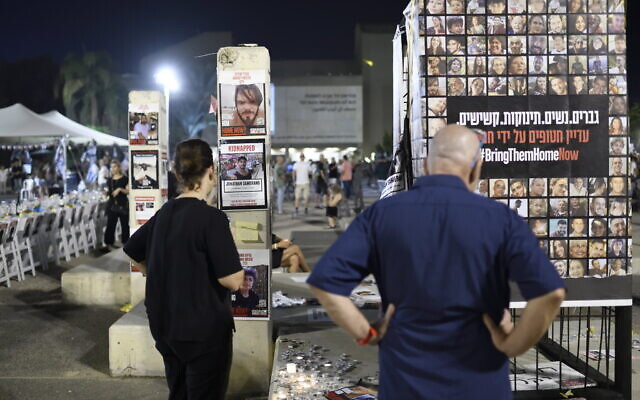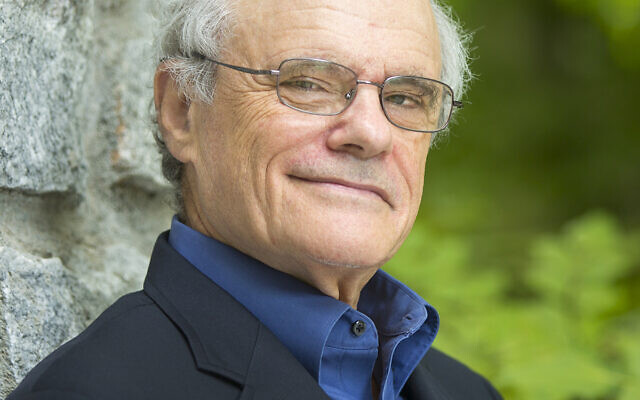Israel Has Controversial History of Hostage Events
An IDI poll shows Israelis split about exchanging Palestinian prisoners for hostages.

The fate of the more than 200 hostages forcibly taken from Israel into Gaza on Oct. 7 by Hamas terrorists and their allies have notably topped the headlines in Israel and the U.S. for a month.
“Kidnapped” posters have been hung – and sometimes ripped down – all over the world. Empty tables and chairs have been set up at events to symbolize their absence. Blue ribbons are being worn as a reminder, not unlike the yellow ribbons tied around trees in the U.S. after 52 American hostages were seized from the U.S. Embassy in Tehran in November 1979. It wasn’t until more than a year later that they were finally released.
While that experience certainly got the attention of Americans, the current situation in Israel is markedly different, and not just because the number of hostages compared to Israel’s population of nine million is dramatically different. Israel has had a long and sometimes controversial history of seeking to retrieve its hostages or even their bodies.
The importance of freeing hostages actually goes all the way back to Genesis, at the beginning of the Bible. References to the emphasis on redeeming hostages are also found in the Mishnah, which is the first major written collection of Jewish oral traditions, and in other early Jewish writings. That may be why Israel places an unusually large importance on saving its people held captive by others.
Those who have followed Israeli news closely for decades can remember when New York-born Zachary Baumel, an American Israeli soldier in the Israel Defense Forces went missing, along with five comrades, in June 1982 during the first Lebanon War. His mother appealed to American Jewish communities for help in retrieving her son. Two of those fellow soldiers were found alive in Syria a few years later, but Baumel’s remains were not returned to Israel until 2019 in coordination with Russian President Vladimir Putin.

Just a few years later, in 1986, Ron Arad, a 28-year-old navigator of an Israeli jet, was captured after parachuting out of his burning plane over Lebanon. For decades, the Israeli public called for his return, hoping that he was still alive. An IDF report concluded in 2004 that he died in the 1990s, but he is still officially missing in action.
According to the Center for Israel Education website, the Second Lebanon War, in 2006, started when Hezbollah launched rockets and mortars at Israeli border towns as a “diversion for a raid across the border to ambush an IDF patrol.” Three Israeli soldiers were killed and two others, Eldad Regev and Ehud Goldwasser, were abducted and taken to Lebanon “in the hope of exchanging them for Lebanese prisoners held by Israel.”
Family members of the two soldiers kept hope alive for them and even traveled to speak to the United Nations, urging its help to retrieve their loved ones. Two years later, the soldiers’ bodies were returned to Israel in exchange for prisoners and bodies.
Also in 2006, Israeli soldier Gilad Shalit was in a tank patrolling the Gaza-Israel border when Palestinian militants entered Israel via a tunnel dug under the border and ambushed the tank. Two of the soldiers were killed immediately and Shalit was captured, then smuggled into Gaza through a tunnel. His captors offered information about where Shalit was in exchange for the release of female and juvenile Palestinian prisoners being held in Israel.
The Israeli government refused to negotiate while Shalit’s parents, in an emotional campaign, kept a spotlight on Shalit’s imprisonment for a long five years. In 2009, the family set up a protest tent in front of Prime Minister Benjamin Netanyahu’s official home in Jerusalem. In the end, Netanyahu exchanged Shalit in 2011 for 1,027 Palestinian prisoners. While many Israelis applauded the decision, controversy also raged because many of those released Palestinian terrorists were imprisoned for murdering Israelis. And some went on to conduct other terrorist attacks.
The debate about exchanging hostages for Palestinians prisoners continues today. A monthly survey conducted by the Jerusalem-based Israel Democracy Institute’s Viterbi Family Center for Public Opinion and Policy Research between Oct. 24-26 this year shows a continuing split of opinion among Israelis.
On the question of whether it would be right or wrong to free large numbers of Palestinian prisoners held in Israel in return for the release of the more than 200 Israeli hostages held by Hamas, a majority of Arab respondents (60.5 percent) were in favor of that exchange, while Jewish respondents were divided with 45 percent who oppose it and 40 percent who support it.
Several U.S. officials have been reported to state that the hostages can’t influence the war Israel is waging against Hamas in Gaza in the wake of the Oct. 7 murderous attack. At the same time, former IDF officials have contended that the hostages have to be a priority.
Center for Israel Education President and Emory University Professor Emeritus Dr. Kenneth Stein said the hostage situation this time differs significantly from past hostage experiences that Israel has dealt with. “It’s the manner in which it was done,” he told the AJT, referring to the Oct. 7 attack as a “heinous act that presses in people’s minds. It’s not only the memory of what happened. It’s living with the stark realization that other individuals were murderously killed when the kidnapping took place.”
Meanwhile, although a handful of hostages have been released at press time, dozens of Israelis and foreign nationals representing 30 countries including the U.S., await a prisoner exchange or a rescue by Israeli forces operating in Gaza. And their many family members continue their pleas for their return in TV interviews.
- Isreal news
- Israel
- Jan Jaben-Eilon
- Gaza
- hamas
- Hostages
- Tehran
- Mishnah
- Zachary Baumel
- Vladimir Putin
- Ron Arad
- Center for Israel education
- Second Lebanon War
- Eldad Regev and Ehud Goldwasser
- Gilad Shalit
- Prime Minister Benjamin Netanyahu
- Viterbi Family Center for Public Opinion and Policy Research
- Dr. Kenneth Stein



comments